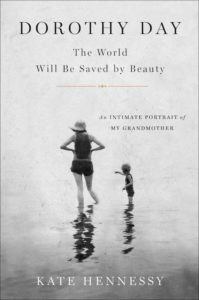 An Intimate Portrait of My Grandmother
An Intimate Portrait of My Grandmother
Dorothy Day (1897-1980) was a prominent Catholic, writer, social activist, and co-founder of a movement dedicated to serving the poorest of the poor. In Dorothy Day: The World Will Be Saved by Beauty, the life and work of this prominent activist is intimately retold by her granddaughter, Kate Hennessy.
Born at the turn of the century, Dorothy Day was a radical during her time, translating her deeply-held spiritual beliefs into prophetic witness to champion social issues. In 1933, she co-founded The Catholic Worker, which spawned the Catholic Worker Movement, an organization of hospitality houses and farming communes that has been replicated throughout the United States and other countries. With a stunning legacy whose contributions continue into today, she remains a candidate for sainthood in the church for her social activism and commitment to her faith. Hennessy, drawing from family letters, diaries, and memories in writing the biography, offers a valuable and nuanced portrait of this undersung and provocative American woman.
In a recent interview with NPR, Hennessy responds to a question on whether Day wrestled with the patriarchal policies of the church:
“Yes, she did. But she also – she always saw the church at its heart. She wasn’t – well, as my mother used to say – she said, Dorothy wasn’t raised in the church. She doesn’t understand the need for, you know – to ask permission. And that was one of the things about the Catholic Worker was that my grandmother did not ask permission to start this. She just started it. She would – she saw what needed to be done and would just do it.
And I think in terms of how that relates to the hierarchical church, she always said that if she was told to stop, she would stop. But, you know, she was on to something. And I think whenever people see that, they recognize that.
And she also said that, you know, when – I mean, there are many ways you can tussle with the church. And people would want her to take up certain causes against the church. And she just said, I will not fight the church. That is not a battle that I am going to do. And I think that that is extraordinarily wise. I mean, I think that you can really get caught up in proceduralism or institutionalism and lose the sight of the heart of a matter. And I think that’s her genius, is that she never lost sight of the heart of the church.”
For more information on the publication, click here. Find the full NPR interview here.
Fellow travelers are scholars, activists, and practitioners that embody the ideals and commitments of the Project on Lived Theology. We admire their work and are grateful to be walking alongside them in the development and dissemination of Lived Theology.
